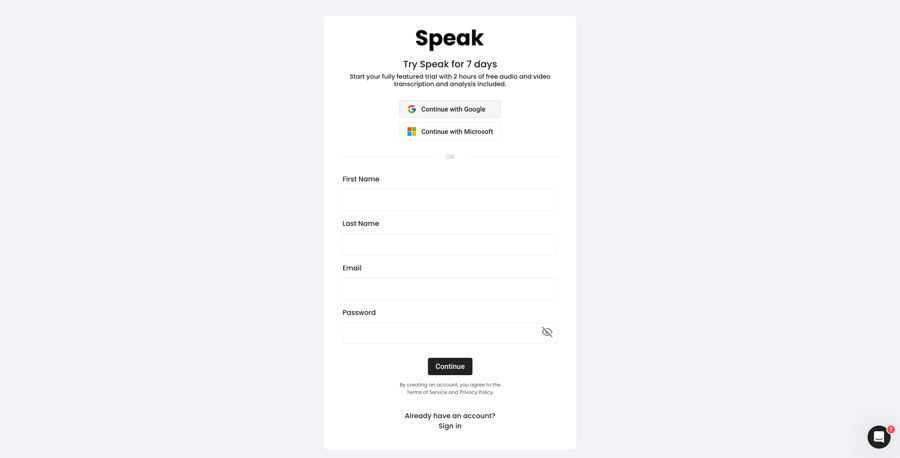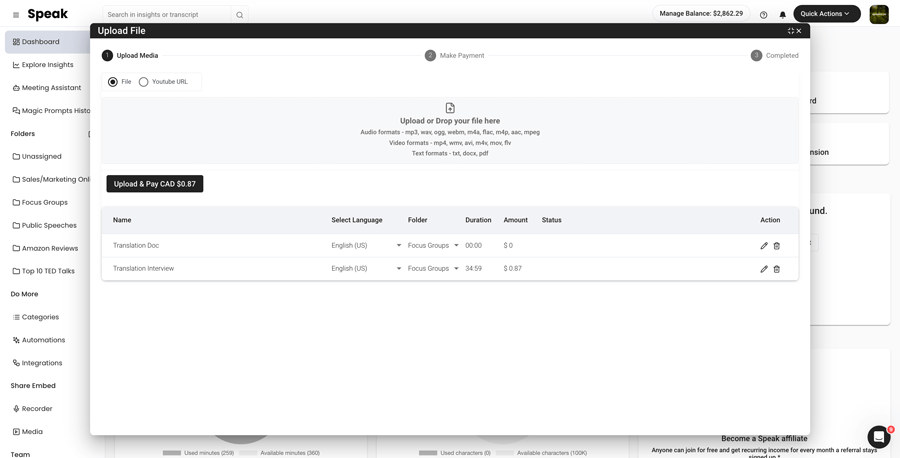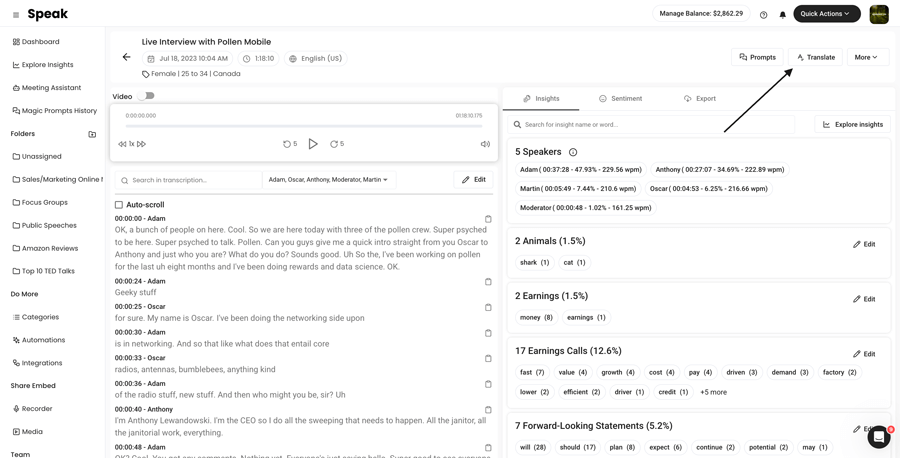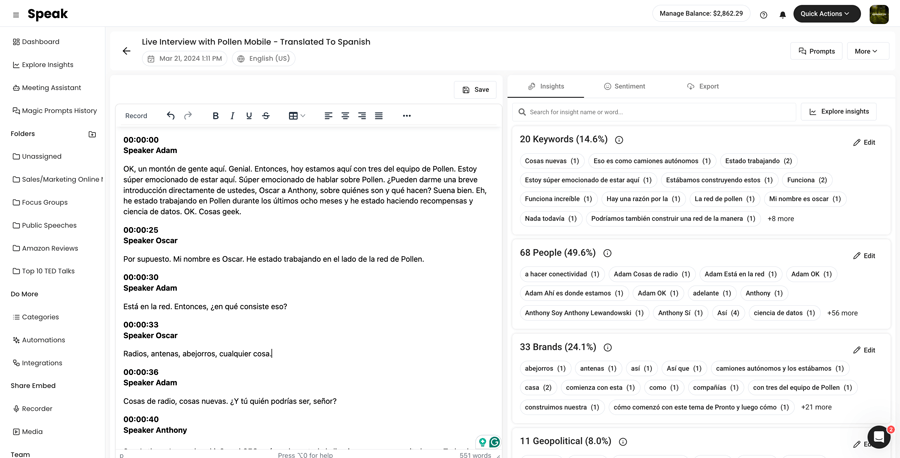How To Translate German to Tatar
Translating German to Tatar is super simple!

Step 1: Register for Speak
Register for Speak using this link.
Once you register, you can instantly begin translating your German to Tatar file(s).

Step 2: Upload Your German file(s)
As soon as you log in, you will be redirected to the dashboard.
Once there, you can select the Quick Action "New Upload".
In Speak, you can seamlessly upload, transcribe and translate audio, video and text files all at once!

Step 3: Translate Your German file(s) to Tatar
Once the file is uploaded, simply visit your file and select "Translate".
If it is an audio and video file, Speak will ask you if you want to keep the speaker names and timestamps in the translation.
Want to translate many files at once? No problem!
You can view the files you want to automatically translate from German to Tatar from the folder level and instantly translate as many files as you need with our artificial intelligence translation in just a few clicks.

Step 4: That's It! View, Analyze, Modify & Export Your New Tatar file(s)
Once the translation is done, you will be alerted and you will see a new document in the same folder your original file is in.
The file will be named the same but with a dash indicating that it is the translated version.
Need support with your German translation?
We are always here and happy to help at Speak!
Just send us a message on live chat on the bottom right corner and we will ensure you are set up for success.
Interested in translating German or other languages to different languages? View our entire list of supported translation languages here.
Automatic, accurate, instant AI translation from German to Tatar is here for you.
Register for Speak using this link and begin translating German to Tatar today.
Unlocking New Horizons: The Power of Translating German to Tatar
In today's globalized environment, effective communication across languages emerges as a critical bridge connecting diverse cultures and fostering mutual understanding. The translation from German to Tatar, though niche, unveils a plethora of opportunities for businesses, researchers, and scholars. With the advancement of AI translation technologies, this once arduous task has become more accessible, offering seamless, accurate translations that pave the way for new collaborations and insights.
Why Translate German to Tatar?
The motivation for translating materials from German to Tatar extends beyond mere linguistic interest. It encompasses a commitment to preserving cultural heritage, expanding research horizons, and enhancing business connectivity. By leveraging state-of-the-art technology such as Speak AI, users gain the capability to automatically translate audio, video, and text efficiently, thus saving time, reducing costs, and significantly boosting productivity.
The Value of AI in Translation
The integration of NLP, large language models, and Generative AI by platforms like Speak AI has revolutionized the translation process. This technological synergy ensures not only linguistic accuracy but also contextual relevance, making translations more natural and effective.
Bridging Cultures in Business and Research
German to Tatar translation finds its significance in the realms of business and academia. For businesses, it opens up new markets and audiences in Tatar-speaking regions. Researchers benefit from the vast array of German scientific and scholarly work, making knowledge more accessible and fostering academic diversity.
Seizing Opportunities with Speak AI
Speak AI's advanced features, such as the AI Meeting Assistant, enable users to transcribe and analyze meetings in multiple languages, including German and Tatar. This facilitates more inclusive and comprehensive multilingual communications. Moreover, with a stellar rating of 4.9 on G2 and a user base exceeding 150K, Speak AI stands as a testament to the efficacy and reliability of automatic translation services.
Understanding the German and Tatar Landscape
German and Tatar are languages steeped in rich histories and cultures, each influencing and shaping regions and populations across the globe.
Geographical Spread and Popularity
German, recognized for its precision and depth, is primarily spoken in Germany, Austria, Switzerland, and parts of Belgium and Luxembourg. With over 95 million native speakers, it holds a significant place in the European Union and the global linguistic landscape.
Tatar, on the other hand, thrives predominantly in Russia, especially in the Republic of Tatarstan and parts of Siberia, with a strong community in Uzbekistan, Kazakhstan, and Ukraine. It boasts around 5.3 million speakers, embodying a vital link to the Tartar culture and history.
Delving Into Language: German and Tatar
A Tale of Two Languages: Facts and Figures
German is renowned for its compound nouns, which allow for the creation of extensive words, reflecting the language's adaptability and precision. Tatar delights with its agglutinative structure, enabling the language to express complex ideas through the addition of suffixes, showcasing its flexibility and depth.
Symbiosis and Divergence
The contrast between German and Tatar extends to their origins and structures. German, a West Germanic language, shares roots with English and Dutch, resulting in similarities that ease learning for speakers of these languages. Tatar, part of the Turkic language family, shares kinship with Turkish and Azerbaijani, presenting a unique linguistic framework characterized by vowel harmony and agglutination.
Despite these differences, both languages exhibit features that bear witness to historical interactions, including loanwords and shared expressions, underscoring the intertwined nature of human cultures.
Embracing the Future of Translation
The ability to translate from German to Tatar effectively leverages technology to break down barriers, foster connections, and illuminate the rich tapestry of human knowledge and culture. Speak AI, with its cutting-edge automatic translation capabilities, embodies a tool not just for linguistic conversion but for cultural and intellectual exchange.
By transforming audio, video, and text from German to Tatar, Speak AI enables businesses to explore new territories and researchers to access invaluable resources. The future of translation is not merely about language but about bridging worlds, and with technologies like Speak AI, that future is brighter than ever.
---
FAQs
What locations are German and Tatar popular?
German is predominantly spoken in Europe, particularly in Germany, Austria, and Switzerland, while Tatar is primarily found in the Republic of Tatarstan in Russia, with significant populations in Central Asia.
What are some fun facts about German and Tatar?
German is notorious for its long compound words, while Tatar is one of the few languages globally that implemented a successful transition from Arabic to Latin and then Cyrillic alphabets.
What are the differences and similarities between German and Tatar?
While originating from distinct language families—German from the West Germanic and Tatar from the Turkic—the two languages share the experience of evolving amidst diverse cultural influences, which is evident in various loanwords and expressions.
Translate German To These Other Supported Languages:
- Translate German-to-Afrikaans
- Translate German-to-Albanian
- Translate German-to-Amharic
- Translate German-to-Arabic (Egypt)
- Translate German-to-Arabic (Iraq)
- Translate German-to-Arabic (Israel)
- Translate German-to-Arabic (Jordan)
- Translate German-to-Arabic (Kuwait)
- Translate German-to-Arabic (Lebanon)
- Translate German-to-Arabic (Oman)
- Translate German-to-Arabic (Palestinian Authority)
- Translate German-to-Arabic (Qatar)
- Translate German-to-Arabic (Saudi Arabia)
- Translate German-to-Arabic (Syrian Arab Republic)
- Translate German-to-Arabic (United Arab Emirates)
- Translate German-to-Arabic Modern Standard (Bahrain)
- Translate German-to-Armenian
- Translate German-to-Assamese
- Translate German-to-Aymara
- Translate German-to-Azerbaijani
- Translate German-to-Bambara
- Translate German-to-Basque
- Translate German-to-Belarusian
- Translate German-to-Bengali
- Translate German-to-Bhojpuri
- Translate German-to-Bosnian
- Translate German-to-Bulgarian
- Translate German-to-Catalan
- Translate German-to-Cebuano
- Translate German-to-Chinese (Simplified)
- Translate German-to-Chinese (Traditional)
- Translate German-to-Corsican
- Translate German-to-Croatian
- Translate German-to-Czech
- Translate German-to-Danish
- Translate German-to-Dari
- Translate German-to-Dhivehi
- Translate German-to-Dogri
- Translate German-to-Dutch
- Translate German-to-English
- Translate German-to-English (Australia)
- Translate German-to-English (Indian)
- Translate German-to-English (Irish)
- Translate German-to-English (New Zealand)
- Translate German-to-English (Scottish)
- Translate German-to-English (South African)
- Translate German-to-English (United Kingdom)
- Translate German-to-English (United States)
- Translate German-to-Esperanto
- Translate German-to-Estonian
- Translate German-to-Ewe
- Translate German-to-Farsi (Persian)
- Translate German-to-Filipino Tagalog
- Translate German-to-Finnish
- Translate German-to-French
- Translate German-to-French (Canada)
- Translate German-to-Frisian
- Translate German-to-Galician
- Translate German-to-Georgian
- Translate German-to-German
- Translate German-to-German (Swiss)
- Translate German-to-Greek
- Translate German-to-Guarani
- Translate German-to-Gujarati
- Translate German-to-Haitian Creole
- Translate German-to-Hausa
- Translate German-to-Hawaiian
- Translate German-to-Hebrew
- Translate German-to-Hindi
- Translate German-to-Hmong
- Translate German-to-Hungarian
- Translate German-to-Icelandic
- Translate German-to-Igbo
- Translate German-to-Ilocano
- Translate German-to-Indonesian
- Translate German-to-Irish
- Translate German-to-Italian
- Translate German-to-Japanese
- Translate German-to-Javanese
- Translate German-to-Kannada
- Translate German-to-Kazakh
- Translate German-to-Khmer
- Translate German-to-Kinyarwanda
- Translate German-to-Konkani
- Translate German-to-Korean
- Translate German-to-Krio
- Translate German-to-Kurdish
- Translate German-to-Kurdish (Sorani)
- Translate German-to-Kyrgyz
- Translate German-to-Lao
- Translate German-to-Latin
- Translate German-to-Latvian
- Translate German-to-Lingala
- Translate German-to-Lithuanian
- Translate German-to-Luganda
- Translate German-to-Luxembourgish
- Translate German-to-Macedonian
- Translate German-to-Maithili
- Translate German-to-Malagasy
- Translate German-to-Malay
- Translate German-to-Malayalam
- Translate German-to-Maltese
- Translate German-to-Maori
- Translate German-to-Marathi
- Translate German-to-Meiteilon (Manipuri)
- Translate German-to-Mizo
- Translate German-to-Mongolian
- Translate German-to-Myanmar (Burmese)
- Translate German-to-Nepali
- Translate German-to-Norwegian
- Translate German-to-Nyanja (Chichewa)
- Translate German-to-Odia (Oriya)
- Translate German-to-Oromo
- Translate German-to-Pashto
- Translate German-to-Persian
- Translate German-to-Polish
- Translate German-to-Portuguese
- Translate German-to-Portuguese (Brazilian)
- Translate German-to-Portuguese (Portugal)
- Translate German-to-Punjabi
- Translate German-to-Quechua
- Translate German-to-Romanian
- Translate German-to-Russian
- Translate German-to-Samoan
- Translate German-to-Sanskrit
- Translate German-to-Scots Gaelic
- Translate German-to-Sepedi
- Translate German-to-Serbian
- Translate German-to-Sesotho
- Translate German-to-Shona
- Translate German-to-Sindhi
- Translate German-to-Sinhala
- Translate German-to-Sinhala (Sinhalese)
- Translate German-to-Slovak
- Translate German-to-Slovenian
- Translate German-to-Somali
- Translate German-to-Spanish
- Translate German-to-Spanish (Mexico)
- Translate German-to-Sundanese
- Translate German-to-Swahili
- Translate German-to-Swedish
- Translate German-to-Tajik
- Translate German-to-Tamil
- Translate German-to-Tatar
- Translate German-to-Telugu
- Translate German-to-Thai
- Translate German-to-Tigrinya
- Translate German-to-Tsonga
- Translate German-to-Turkish
- Translate German-to-Turkmen
- Translate German-to-Twi (Akan)
- Translate German-to-Ukrainian
- Translate German-to-Urdu
- Translate German-to-Uyghur
- Translate German-to-Uzbek
- Translate German-to-Vietnamese
- Translate German-to-Welsh
- Translate German-to-Xhosa
- Translate German-to-Yiddish
- Translate German-to-Yoruba
- Translate German-to-Zulu



